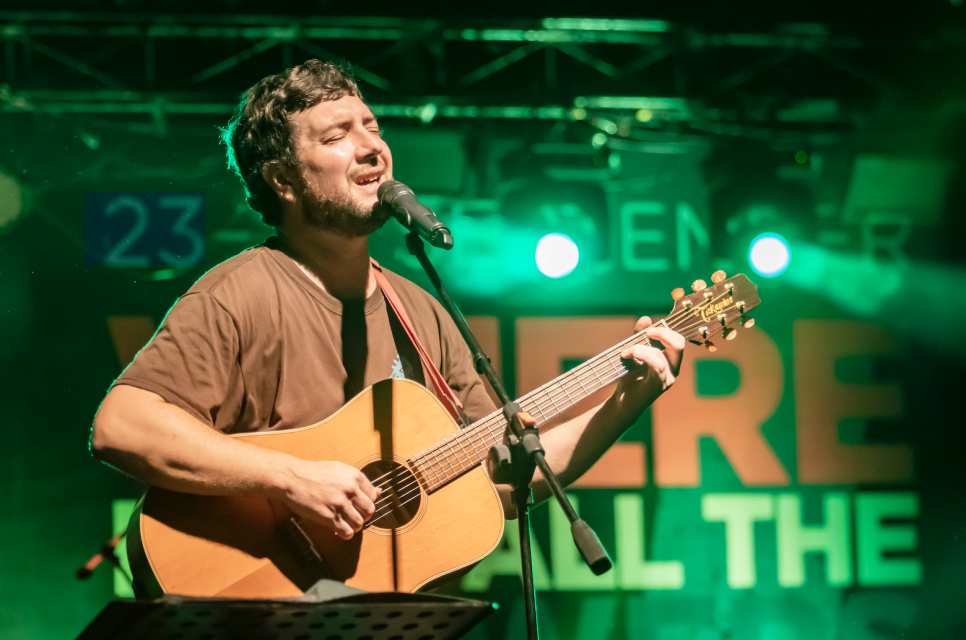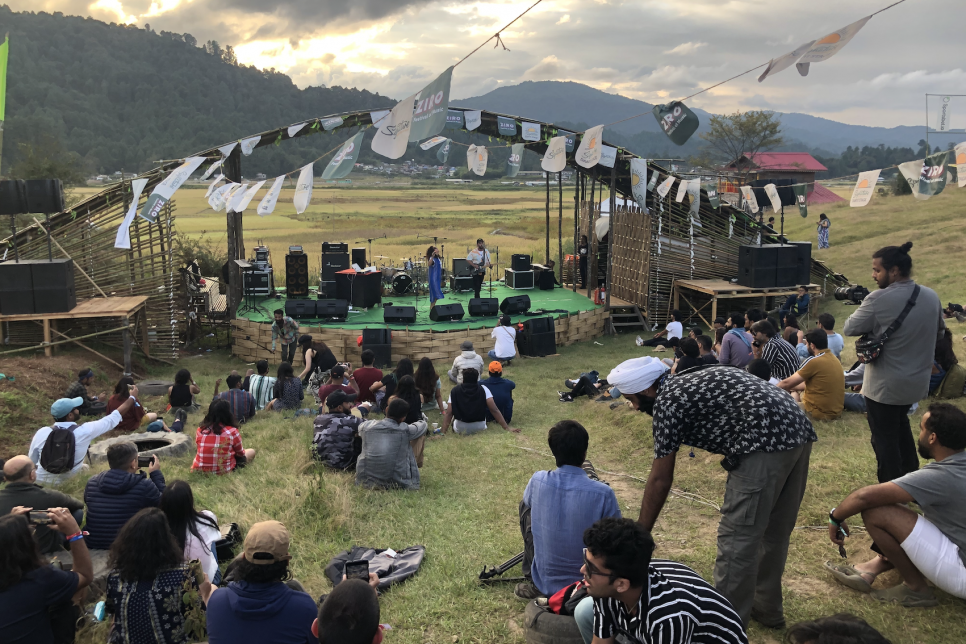Prior to the pandemic, I was a regular visitor to India and to the Northeast in particular. My connection with Meghalaya and the Khasi community indigenous to the region began in 2016, when I began working on a PhD as part of a research project based at the University of South Wales. Using creative practice, the project sought to open a dialogue between artists from Wales and the Khasi Hills as a way of exploring the historic connection between the two communities. This connection is rooted in the Welsh Calvinist mission that was active in the region between 1840 and 1969. Over the last five years the project has spread beyond the academic realm, producing Performing Journeys; a theatre production that has toured in India and Wales, and an album of music from the Khasi-Cymru Collective based on Khasi and Welsh folk traditions.
The last time I visited India was February 2020, as musical director of Performing Journeys. The cast was made up of artists from Wales and the Khasi Hills and we played to audiences in Kolkata, New Delhi, Jowai and Shillong. Little did we know that all our progress was about to be put on hold for the next two years as the world battled Covid 19. During the pandemic I endeavoured to keep my connection with the Khasi commuity alive, staying in regular contact with artists from the colletcive and collaborating online with the Khasi poet and performer Lapdiang Syiem.
At the same time, I was nurturing a new connection with Jodhpur Rajasthan International Folk Festival(Jodhpur RIFF) supported by the British Council. With international travel impossible, this project also moved online and developed into a collaboration with Asin Khan Langa, a wonderful singer and Sarangi maestro from the Langa community of Western Rajasthan. Over the last two years, Asin and I have been collaborating via WhatsApp, sharing videos and audio of our music and looking for ways to bring our traditions together.
It was with great pleasure that I was finally able to return to India this year, to reconnect with the Khasi-Cymru Collctive and to take up offers to perform at several Indian music festivals, including Jodhpur RIFF. I first traveled to Manipur, to perform at ‘Where Have All The Flowers Gone?’ a festival of protest music based in Phayeng on the outskirts of Imphal.

I was joined onstage by two members of the Khasi-Cymru Collective; the poet Lapdiang Syiem and multi-instrumentalist Apkyrmen Skhem. It was wonderful to perform together again and I was immensely proud when we closed the set with Lapdiang’s powerful poem ‘To the men with hate speech on their lips’. It was fascinating to learn about Manipuri culture and forest conservation from our gracious hosts Loiya Moirangthem and Chaoba Thiyam. We were very lucky too to sample some delicious Manipuri cooking courtesy of Purnima Yengkokpam and Kamlesh Khundrakpam. Thanks too to Akhu for the invitation to play!
From Manipur I traveled to Shillong to reconnect with members of the Khasi-Cymru Collective and to rehearse with Meban Lyngdoh ahead of our show at Jodhpur. It wasn’t long before I was on the road again however, this time to the Ziro Valley in Arunachal Pradesh. Ziro Festival is blessed with one of the most beautiful locations of any festival I’ve ever been to. It sits serenely amongst acres of paddy fields hemmed in by high mountains on all sides. The sight and sound of the indigenous Apatani people harvesting rice in the fields provides a constant, calming backdrop to the festival, which boasts an eclectic line-up of artists from all over India and beyond. It was a real pleasure to perform songs from my solo work as well as some Khasi-Cymru Collective numbers to an attentive audience with that gorgeous backdrop behind me. I had time to catch some of the other acts too, and was blown away by Manipuri artist Mangka and her brilliant band performing on the main stage on Saturday night. Shout out to Radio Baghdadtoo, you were great on the day stage! I also joined Welsh/American multi-instrumentalist William Rees for a couple of improvised tracks on the day stage, combining my Duitara with his experimental Viola stylings. I’m very grateful to the British Council for inviting me to perform as part of the India-UK Season of Culture and huge thanks to Lubna Shaheen, Anup Kutty, Aido and the Ziro team for giving me some stage time!
From the Ziro valley I traveled for 25 hours on trains, planes and automobiles right accross India to Rajasthan, 1500 miles away. At New Delhi airport I teamed up with Khasi musicians Dr Meban Lyngdoh, Risingbor Kurkalang, Amabel Susngi and Banshai Mukhim and we traveled together to Jodhpur. When Divya Bhatia (Musical Director of Jodhpur RIFF) and I began working together in 2020 one of our key aims was to bring Khasi artists to perform at Jodhpur RIFF for the very first time. I felt very emotional seeing this dream finally become a reality, as Khasi rhythms and Amabels’ beautiful vocals rose with the sun during their dawn showcase at Jodhpur RIFF, the light gradually illuminating the glorious Mehrangarh fort in the background. The previous day, an interactive session had allowed a keen audience to delve into the intricacies of Khasi folk music and culture.
At Jodhpur I finally got to meet Asin Khan Langa and we were given time to jam out some of our ideas in the run up to the festival. I also met with percussionists Sadik Khan Dholak and Zakir Khan Langa, who together with Asin make up the contemporary Rajasthani folk band SAZ. It was a joy to work up some songs together and to perform on the main stage at Mehrangarh fort. I began by performing solo, giving the audience a taste of some of my favourite Welsh melodies. I was then joined onstage by Meban, Amabel, Rising and Banshai to perform two Khasi-Cymru Collective songs. Then it was the turn of Sadik, Asin and Zakir (SAZ) to joi the show. We performed a brand new song called ‘Atebion’ (‘answers’ in Welsh) and a new arrangement of the folk song ‘Kinji’ with me playing the cello, which really worked with Asin’s phenomenal Sarangi. The Khasi musicians returned to the stage for the big finale, blending Rajasthani Rhythms with Khasi beats and Welsh folk guitar. It was a really special moment, made even better by the rapturous applause and cheers that echoed around the ancient walls of the Mehrangarh fort for a good while.
I’d like to thank the British Council, who supported the collaborartion with Jodhpur RIFF and Asin Khan Langa through the Connections through Culture fund. I’d also like to thank Wales Arts International for providing the financial support for the tour and live collaboration. Thanks as well to Divya Bhatia, for always remaining positive and supporting this collaboration through the many hurdles we have faced in the last few years. Thanks to all the amazing musicians that took part in the tour, it is thanks to your talent and generosity that this music was made and shaerd with the world. It took a while, but it finally happened and I hope I’m not being too immodest when I say; it was worth the wait.

